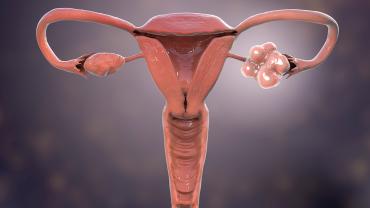
Polycystic ovary syndrome (PCOS) is a heterogeneous endocrine disorder that globally affects up to 10% to 15% of women during reproductive age. PCOS consists of ovulatory dysfunction, hyperandrogenism, and multiple follicular cysts accompanied by metabolic abnormalities like insulin resistance, hyperinsulinemia, and adiposity. The long-term impact of PCOS is associated with an increased risk of endometrial cancer, type 2 diabetes mellitus, and cardiovascular events. PCOS has also been described as one of the leading causes of infertility in industrialized areas. Recent research suggests inositol may help support the body’s endocrine, metabolic, and reproductive abnormalities seen in PCOS.
In general, inositol serves as a second messenger with insulin-like functions. It has nine isomers and the two most common are myo-inositol (MI) and D-chiro-inositol (DCI). MI is synthesized endogenously mostly in the kidneys and DCI originates from MI through the action of insulin.
MI is involved in cellular insulin sensitivity and glucose uptake, which is crucial in the ovary for follicle stimulating hormone (FSH) signaling. DCI is involved in glycogen synthesis and insulin-mediated androgen production. Although MI levels are always higher than DCI levels in tissues, the ratios can vary. For example, glycogen-storing tissues (muscle, fat, and liver) have higher DCI levels compared to tissues with high glucose consumption (brain and heart). MI and DCI can both lower luteinizing hormone (LH), testosterone, and the LH to FSH ratio, which may help to lower the effects of hyperandrogenism in PCOS like hirsutism and acne.
A randomized, open-label clinical trial (n = 56) compared the efficacy of different MI to DCI ratios administered to PCOS patients. They concluded that 2 g of inositol twice daily for 3 months at a ratio of 40:1 MI to DCI best improved ovulatory and hormonal functioning in women with PCOS compared to other ratios. The 40:1 ratio has been supported by clinical reviews and implemented in a randomized controlled trial (n = 46) looking at young overweight women with PCOS. The clinical trial observed a statistically significant reduction in LH, free testosterone, and fasting insulin and an increase in 17-beta-estradiol levels with no relevant side effects from supplementation with 550 mg of MI and 13.8 mg of DCI (40:1 ratio) compared to the placebo.
A meta-analysis (n = 1,079) looked at the efficacy and safety of four oral insulin sensitizers (metformin, thiazolidinediones, inositol, and berberine) to improve the metabolic and endocrine profiles in women with PCOS. The inositol group (both MI and DCI) surpassed metformin alone in improving insulin resistance and decreasing total testosterone and was especially efficacious in menstrual recovery.
The connection between MI, DCI, and PCOS is supported by two international consensus conferences. The insulin-sensitizing and hormonal effects of MI and DCI inositol isomers may help support the metabolic and reproductive functions of women with PCOS.
By Danielle Moyer, MS, CNS, LDN